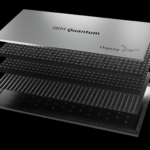Code translation: maximizing quantum computing applications

Quantum computers are fascinating machines. While classical processors step through their calculations with each tick of the clock, quantum machines take a radically different approach. To picture the scene, imagine multiple solutions being generated at once, with the strongest prospects rising up like waves on the ocean. The processing architecture may feel unfamiliar, but the rewards in terms of quantum computing applications have huge potential.
Such a jump in computing capability – referred to as ‘quantum advantage’ – has use cases across a wide range of industries. Classical computers have already revolutionized the design of aircraft and automobiles – to give just a couple of examples – but quantum machines could take this to a whole new level. Faster computation would feed directly into company profits or allow many more designs to be explored. But there’s also the promise of solving problems that are intractable on current machines.
Just scratching the surface
We’re already seeing the emergence of so-called ‘quantum annealing’ – an approach that takes a mathematical example and reframes it as a physics problem. Leveraging the laws of thermodynamics, systems programmed with various parameters find a minimum energy state to solve optimization problems. But this only scratches the surface of quantum computing applications.
Bigger rewards will come from the application of more structured quantum algorithms, according to experts. “In my view, they open up a much richer set of problems,” Joe Fitzsimons, CEO and founder of Horizon Quantum Computing, told TechHQ. “They allow you to tackle systems of differential equations.” This capability would open the door to superior modeling of fluid flow – for example, to build better jet engines or more elegant wind turbines.
Being able to use more structured quantum algorithms could benefit machine learning too. In principle, there are many techniques that could demonstrate an exponential speed-up if programmed to run on a quantum computer. But this gets to the heart of one of the current challenges – and something that Horizon Quantum Computing is keen to solve.
Addressing the algorithms bottleneck
While there are millions of software developers, the pool of quantum computing experts is much smaller. And getting to grips with an architecture built around the interference between quantum amplitudes requires – as you can imagine – years of experience. But what if programmers could use the knowledge that they already have? Today, there are software libraries that allow users to solve pre-programmed problems, but Fitzsimons and his team want to go further. Their plan is to develop a compiler that abstracts away hardware complications to unlock a full suite of quantum computing applications.
“Our long-term goal is to build a system that constructs quantum algorithms for conventional code,” he explained. Fitzsimons cautions that their solution is at an early stage, but at the same time points out that steady progress is being made. For example, the group has been able to demonstrate acceleration using a portion of Matlab code. Having a compiler stack capable of deriving quantum efficient algorithms from common programming languages would unlock a wealth of existing applications know-how – for example, in financial modeling, industrial design, and other sectors.

Quantum experts: Joe Fitzsimons and Si-Hui Tan lead a team of scientists and computer engineers focused on making quantum machines easier to program. Image credit: Horizon Quantum Computing.
Technology remains another barrier to getting the full suite of quantum computing applications up and running. But gains are being made as hardware developers show progress in moving through their product roadmaps. The total number of quantum bits (or qubits) doesn’t necessarily reveal the full story, as error rates need to be considered too. However, the commercial prospects are encouraging. “The pendulum is starting to move from academia into industry,” comments Fitzsimons.
New European office
Formerly leader of the Quantum Information and Theory Group at Singapore University of Technology and Design, he founded Horizon Quantum Computing in 2018. At the firm, Fitzsimons brings 18 years of quantum expertise to the table. And driving the company towards its compiler goal is a wealth of intellectual talent, which includes Si-Hui Tan – Chief Science Officer at Horizon Quantum Computing. Tan was recognized last year as one of the rising stars of tech by the Singapore Computer Society and, like Fitzsimons, has been working in the sector for 18 years.
The firm, which is based in Singapore and due to set up a European office in Ireland, is well-integrated into a global network of companies busy exploring quantum computing applications. And the trend for hardware developers to make their machines accessible in the cloud, further helps in testing the company’s solution across a variety of quantum computing designs.
Speaking with Fitzsimons, it’s clear that he wants Horizon Quantum Computing to make a positive impact. And giving users the capability to produce fast, efficient implementations of their code – written in languages familiar to vast numbers of software developers – regardless of the underlying quantum hardware, would certainly achieve that goal.









